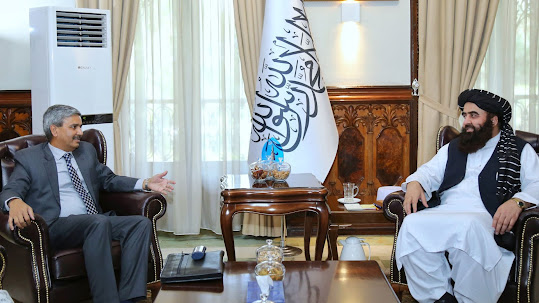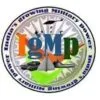Source : Nikkei Asia
 |
| J. P. Singh, joint secretary in India’s foreign ministry, meets the Taliban’s Acting Foreign Minister Amir Khan Muttaqi in Kabul. (Photo from Taliban spokesman Abdul Qahar Balkhi’s Twitter account) |
New Delhi: India is stepping up engagement with Afghanistan’s Taliban rulers, insisting that it has only humanitarian motivations, while analysts frame the ties in the context of geopolitical rivalries with China and Pakistan.
A team of officials from India’s foreign ministry, led by joint secretary J. P. Singh, traveled to Kabul earlier this month, marking the first official visit from New Delhi since the Taliban seized control of Afghanistan in August last year. There to “oversee” the delivery of Indian assistance, the team met with the Taliban’s Acting Foreign Minister Amir Khan Muttaqi and his deputy, Sher Mohammad Abbas Stanikzai.
India, which has not recognized the Taliban regime, has already dispatched 20,000 million tons of wheat, 13 tons of medicines and 500,000 doses of COVID vaccines to Afghanistan, and is in the process of shipping more medical and grain supplies.
Indian officials are adamant that the delegation’s trip was simply part of the aid effort. “I think you are reading too much into this visit,” Indian foreign ministry spokesperson Arindam Bagchi told reporters in response to a volley of questions about the tour. “This visit is about our humanitarian assistance to the people of Afghanistan.”
Some analysts think there was more to it, with India cautiously eyeing the presence of China in particular.
“India is concerned that if Kabul is left alone … China will get [a] chance to enhance its influence” in Afghanistan, Shamshad Ahmad Khan, an assistant professor of international relations at the BITS Pilani Dubai Campus, a technical research university, told Nikkei Asia. This would raise the risk that the “goodwill” India earned through development and infrastructure projects prior to the Taliban capturing power “will go in vain,” he said.
“New Delhi is wary that the vacuum left by it will be filled by Beijing,” Khan added, saying Afghanistan’s deepening humanitarian crisis creates an opening for India to “reset” ties with the war-torn country.
At the same time, he said that India is keeping a “low profile so as not to send a signal to the West that it [could recognize] the Taliban as a legitimate ruler of Afghanistan.”
Likewise, China has not formally recognized the Taliban. But Beijing has signaled that it is exploring various avenues for cooperation.
“Afghanistan is ready to actively participate in [Beijing’s] Belt and Road cooperation and strengthen trade and investment cooperation with China,” the Chinese foreign ministry said in a statement in late March, after top diplomat Wang Yi met with Muttaqi in Kabul. This was the highest-level visit from China to Afghanistan since the Taliban takeover.
China said it opposes “the political pressure and economic sanctions on Afghanistan imposed by nonregional forces at every turn,” in a thinly veiled reference to U.S. measures against the Taliban. At the same time, it urged the Taliban to “build an inclusive government and exercise prudent governance, and continue to make positive efforts in a direction that serves the interests of the Afghan people and the expectations of the international community.”
China is among several countries such as Pakistan, Russia and Turkey whose missions in Kabul have remained operational after the withdrawal of U.S. and NATO troops from Afghanistan.
When the Taliban grabbed power last year, many also saw it as a win for India’s archrival Pakistan, which was considered to have closer ties with the extremist group. But now it is less clear that Islamabad has the edge in the country, potentially giving India another opportunity to one-up a regional competitor.
Differences have sharpened between Pakistan and the Taliban over territory and cross-border militant activity by Tehrik-e-Taliban Pakistan, a terrorist group affiliated with the Afghan Taliban. At the same time, Islamabad is dealing with its own worsening economic crisis, meaning it is not in a position to help Afghanistan in the same manner as New Delhi.
The “Taliban have been repeatedly signaling to India that they want to have an independent foreign policy and want to engage with India without any [interference] from Pakistan,” said Harsh V. Pant, vice president for studies and foreign policy at the New Delhi-based Observer Research Foundation think tank and a professor of international relations at King’s College London.
New Delhi’s outreach “doesn’t mean recognition but [shows that] India is willing to give the Taliban some level of support and engage with them at a very basic level to see how far the Taliban are willing to engage with India more substantively,” Pant said. “India is testing the waters.”
The Taliban, hungry for international legitimacy, played up the Indian visit.
Tweeting a picture of the Singh-Muttaqi meeting on June 2, Taliban foreign ministry spokesman Abdul Qahar Balkhi said their talks focused on “diplomatic relations, bilateral trade [and] humanitarian aid.”
He said Muttaqi welcomed the Indian delegation to Kabul, calling it “a good beginning.” The Taliban side, he added, urged the resumption of Indian-funded projects in Afghanistan, New Delhi’s diplomatic presence in Kabul and the provision of consular services to Afghans, particularly students and those seeking medical treatment.
According to Balkhi, the Indian delegation said they wanted positive relations with Afghanistan, and that New Delhi “would consider assisting [and] working with Afghanistan in various fields.”
Pankaj Jha, a professor of defense and strategic studies at the O.P. Jindal Global University, however, warned that New Delhi cannot continue to engage the Taliban for long without tangible returns. This might include an agreement that the group should not be sending fighters to the Indian-administered Kashmir region — the focus of a long-standing territorial dispute with Pakistan — to fuel terrorism.
“This is a major security concern for India,” he said.
Still, Jha said India’s outreach to the Taliban stems from a sense that “it can regain its foothold in Afghanistan,” especially in light of Pakistan’s struggles. New Delhi is also positioning itself as a benefactor for Afghanistan at a time when the world’s attention is on the war in Ukraine, Jha suggested.




